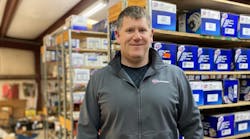Asbury Automotive Group VP speaks out.
Henry Day, vice president of fixed operations, Asbury Automotive Group
Henry Day is vice president of fixed operations for Duluth, Ga.-based Asbury Automotive Group, a $4.6 billion chain of automotive retailers that includes 86 auto and heavy truck stores selling both domestic and foreign nameplates.What is biggest challenge facing your parts and service departments today?
Customers are fewer in number and they are less willing to do factory-recommended maintenance, which have extended mileage intervals by the manufacturers and fewer parts, in general. Many customers are watching what they spend very closely, and want to do the minimum possible. These customers also want to delay repairs if they can. Our collision and collision parts business is challenged by the insurers wanting to use more aftermarket parts.
The customers' view of what constitutes value has changed somewhat. Since price is a bigger factor than it used to be, we need to do things differently. The old equation included price, to be sure, but the other factors of convenience, treatment, quality, amenities and complete coverage of needs were important also. The customers still want these things, and it sets us apart from our competition. However, many customers need to feel we offer an even higher value for money.
Connecting the customer more directly to the service provider—the feeling of indifference to their needs as individuals is still the number one reason customers leave and go somewhere else. Some of our competition is good at connecting with their customers. We as dealerships need to get better; Asbury has strategies and processes that help us connect initially and stay connected longer than our dealer competition.
What sort of strategies do you use to attract new parts and service business? What's been the most effective?
We have always believed in sticking to the basics of quality customer service. This attracts customers by word of mouth. We have also worked to close the loop between the sale of a new or pre-owned vehicle and our service, parts and collision centers. These customers are not ours, and are potential conquests until they visit our fixed operations for the first time.
Do you do much business selling wholesale parts to body shops or other repair shops? How do you ensure that business is profitable?
Approximately 38 percent of our parts business is wholesale. The only viable means to profitable wholesale, that we have found, is to try to be the dominant player as much as possible in a market. We share the expenses associated with wholesale parts, such as combined delivery services, outside sales representation and receivables. It is not about being the lowest priced, but in giving the best service.
Has fixed-ops become more important to your business during the recent economic downturn?
Fixed-ops has always been vital to Asbury. We measure fixed absorption rate monthly in each dealership and adjust accordingly. Fixed has even greater value in light of the down-turn in vehicle sales. Fixed-ops has never operated in the shadow of variable at Asbury. We have enjoyed an excellent partnership between fixed and variable that has ensured Asbury has been able to prosper in these difficult times.
Have your dealerships been impacted by OE inventory management programs like GM's RIM system? How are those programs working for you so far? Are there any significant differences in the way you manage parts inventories by OE brand? If so, can you explain what those differences are?
The OE inventory management programs are great for controlling parts that meet their criteria. The dealership parts manager reviews a suggested list from the manufacturer and either approves or rejects the order. The problems arise if you are a large parts wholesaler and you have a high volume of special orders. If any of these special orders are returned by your customers, you are not protected by the manufacturer. Most OEMs have decreased the percentage earned for parts returns. The dollar amount of non-stock parts in your inventory can get out of hand quickly.


